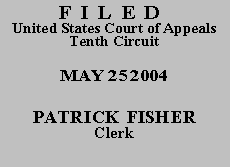

| JOHN HALL,
Plaintiff-Appellant, v. UNITED PARCEL SERVICE, INC., Defendant-Appellee. |
|
Plaintiff, John Hall, appeals from an order of the district court granting defendant's motion to dismiss this action brought pursuant to the Americans with Disabilities Act (ADA), 42 U.S.C. §§ 12101-12213. We affirm.
Mr. Hall was terminated from his employment with defendant in 1999. He filed a charge of discrimination with the Oklahoma Human Rights Commission and, subsequently, received his right-to-sue letter March 23, 2001. On June 18, 2001, he filed a timely suit in district court with the aid of counsel. Approximately six months later, Mr. Hall, again acting through counsel, filed a motion to dismiss his case without prejudice. The motion was granted and the case was dismissed on January 23, 2002. Almost one year later, Mr. Hall, acting pro se,(1) filed this suit in district court.
Defendant filed a motion to dismiss for failure to state a claim under Fed. R. Civ. P. 12(b)(6). Defendant asserted that Mr. Hall's claim was "doubly time-barred" because he had not timely filed his charge with the Oklahoma Human Rights Commission and because he had not timely filed this suit.(2) Aplt. App. at 7. The district court made no finding regarding the timeliness of the filing of the EEOC charge, but concluded the lawsuit was untimely filed. In reaching that conclusion, the district court rejected Mr. Hall's contention that the statute of limitations was tolled following the dismissal of his initial suit.
On appeal, Mr. Hall argues that the statute of limitations should be tolled considering the societal reasons underlying the passage of the ADA and related civil rights legislation. He also contends that he was not sleeping on his rights and that attorney misconduct justifies equitable tolling.
"We review de novo the district court's dismissal under Fed. R. Civ. P. 12(b)(6) for failure to state a claim upon which relief can be granted." Ruiz v. McDonnell, 299 F.3d 1173, 1181 (10th Cir. 2002), cert. denied, 538 U.S. 999 (2003). We review "the district court's decision not to apply equitable tolling for an abuse of discretion." Harms v. IRS, 321 F.3d 1001, 1006 (10th Cir.), cert. denied, 124 S. Ct. 159 (2003).
A plaintiff must initiate litigation on an ADA claim within ninety days from the date he receives a "right to sue" letter from the EEOC. See 42 U.S.C. § 2000e-5(f)(1) (providing filing deadlines for Title VII claims); 42 U.S.C. § 12117(a) (specifically adopting Title VII filing deadlines for ADA claims). "These timing requirements are prerequisites to a civil suit." Croy v. Cobe Labs., Inc., 345 F.3d 1199, 1202 (10th Cir. 2003). Mr. Hall agrees that he did not comply with these requirements. However, he contends that these requirements should be tolled in his case because his counsel gave him erroneous advice when counsel told him he could timely refile his action within one year of the date his first case was dismissed.
Generally, "a voluntary dismissal without prejudice leaves the parties as though the action had never been brought." Brown v. Hartshorne Pub. Sch. Dist. No. 1, 926 F.2d 959, 961 (10th Cir. 1991). However, in the absence of a statute to the contrary, the statute of limitations is not tolled during the pendency of the dismissed action. Id. "The requirement that a plaintiff file a timely civil action after the disposition of an individual EEO complaint is not a jurisdictional requirement, but rather is subject to . . . equitable tolling." Harms, 321 F.3d at 1006. The time limit for filing a complaint after receipt of an EEO right-to-sue notice "will be tolled only upon a showing of active deception where, for example, the plaintiff has been actively misled or lulled into inaction by her past employer, state or federal agencies, or the courts." Simons v. Southwest Petro-Chem, Inc., 28 F.3d 1029, 1031 (10th Cir. 1994) (emphasis added) (quotations omitted). "[T]he propriety of equitable tolling must necessarily be determined on a case-by-case basis." Johnson v. United States Postal Serv., 861 F.2d 1475, 1481 (10th Cir. 1988) (quotation omitted).
Mr. Hall alleges that he failed to file his second ADA action promptly because he was actively misled by his counsel. We note, however, that Mr. Hall received a right-to-sue letter from the EEOC. This letter contained, in bold print, the warning that he had to file any lawsuit within ninety days of the receipt of the letter, Aplee. Supp. App. at 102, thus alerting him that timeliness was critical to preserving his claim. Moreover, it was Mr. Hall's own attorney who gave him incorrect information, not his employer, an agency, or the court. "Mere attorney negligence does not justify equitable tolling." Steed v. Head, 219 F.3d 1298, 1300 (11th Cir. 2000); see also Irwin v. Dep't of Veterans Affairs, 498 U.S. 89, 96 (1990) (principles of equitable tolling do not extend to "a garden variety claim of excusable neglect"). The district court did not abuse its discretion in determining that the principles of equitable tolling did not apply here.
The judgment of the district court is AFFIRMED.
Entered for the Court
Circuit Judge
*. This order and judgment is not binding precedent, except under the doctrines of law of the case, res judicata, and collateral estoppel. The court generally disfavors the citation of orders and judgments; nevertheless, an order and judgment may be cited under the terms and conditions of 10th Cir. R. 36.3.
1. Since commencing this action, Mr. Hall obtained counsel who represented him after he filed the complaint and continues to do so on appeal.
2. Defendant also sought attorney's fees. The district court denied that part of the motion. Defendant does not appeal that determination.